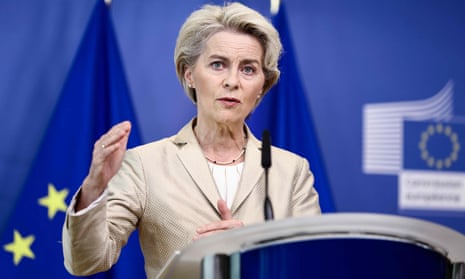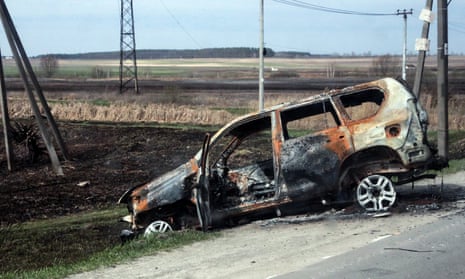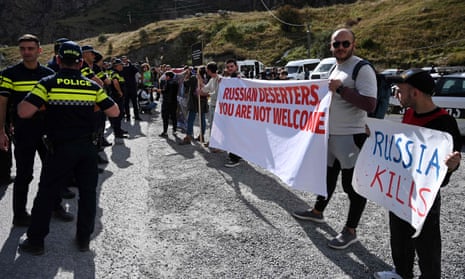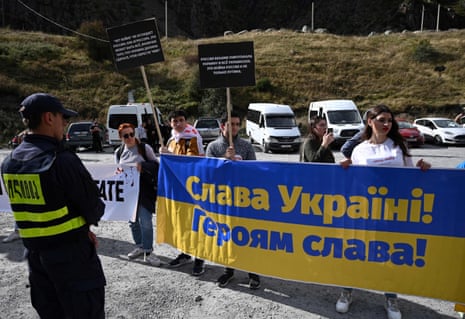Russia-Ukraine war live: Kremlin-backed officials ask Putin to annex regions; EU announces new sanctions on Russia | Ukraine
EU proposes new sanctions package to ‘make Kremlin pay’
The head of the European Commission, Ursula von der Leyen, has announced a fresh round of proposed sanctions on Russia.
The new package of Russian sanctions is designed “to make the Kremlin pay” for escalating the conflict in Ukraine through mobilisation and “sham referenda that are an illegal attempt to grab land and change international borders by force”, she said.
The proposed eighth sanctions package includes further import bans on Russian products, expected to deprive Moscow of an additional €7bn in revenues.

The EU will also extend export bans on key technology used for the military such as aviation items, electronic components and specific chemical substances. This will “weaken its capacity to modernise” Russia’s military base, she said.
The sanctions package will lay the legal basis for an oil price cap and ban EU citizens from sitting on governing bodies of Russian state-owned companies, she said.
Speaking to reporters, von der Leyen said:
We do not accept the sham referenda and any kind of annexation in Ukraine, and we are determined to make the Kremlin pay for this further escalation.
Russia has escalated the invasion of Ukraine to a new level.
And we are determined to make the Kremlin pay the price for this further escalation.
Today, we are proposing a new package of biting sanctions against Russia ↓
https://t.co/MrirRm1m4l— Ursula von der Leyen (@vonderleyen) September 28, 2022
Key events
Britain’s prime minister, Liz Truss, told President Volodymyr Zelenskiy in a phone call that the UK would never recognise Russian attempts to annexe parts of Ukraine, Downing Street said.
In a statement, a No 10 spokesperson said:
The Prime Minister spoke to President Zelenskiy this afternoon to underline the UK’s steadfast support in light of Russia’s sham referendums in Ukraine.
The Prime Minister made clear that the UK would never recognise Russian attempts to annexe sovereign territory. She reiterated that Ukraine could depend on the UK’s support until President Putin was defeated.
President Zelensky updated the Prime Minister on the current military situation and welcomed her strong backing, including at the UN General Assembly last week.
Truss also thanked the Ukrainian president for his work in securing the release of five British nationals held by Russian-backed proxies in eastern Ukraine, the spokesperson continued.
They added:
The leaders also discussed how the UK and Ukraine could work together to secure Ukraine’s gas supplies in the long term. Both agreed to stay in close touch in the coming days and weeks.
Zelenskiy also tweeted about the call and said he expected London’s leadership in response to what he called the “sham referenda” in occupied parts of Ukraine.
Had a phone conversation with 🇬🇧 PM @trussliz. The UK has always been among the leaders in supporting Ukraine. We expect London’s leadership in reaction to Russian sham referenda as well. Defense and financial aid to Ukraine must be enhanced in response.
— Володимир Зеленський (@ZelenskyyUa) September 28, 2022
Serbia’s president, Aleksandar Vučić, has said he will not recognise the results of the so-called referendums held in four regions of Ukraine partly occupied by Russian forces.
Speaking to reporters, Vučić said:
Serbia … will not recognise that (referendums) as it adheres to international law, the United Nations Charter and UN resolutions.
Belgrade normally has strong ties with Moscow; Serbia is solely reliant on Russia for its natural gas supplies and has refused to join western sanctions against Russia.
Vučić added:
We are protecting our own territorial integrity and it is in our best interest to protect the territorial integrity of other internationally recognised countries.

Isobel Koshiw
Ukrainian authorities say they have identified five Russian soldiers who allegedly shot at civilian cars in the Kyiv region during the first days of the war.
CCTV footage gathered by Ukrainian investigators shows Russian units shooting at civilian cars along roads just outside Hostomel, a town north-west of Ukraine’s capital, Kyiv.
In one of the clips, a car catches fire after being shot by troops stationed in the forest opposite. The driver of the car died, according to Ihor Klymenko, the head of Ukraine’s national police force.

Klymenko said the Russian soldiers shot as if they were on “safari”. One of the cars examined as part of the case had 178 bullet holes, he said.
The Russian soldiers are charged with killing five people, and injuring a further six, who were trying to flee Hostomel on 25 February, a day after Russia invaded. A total of 11 people were killed and 14 injured on the stretch of road in question, say Ukraine’s authorities.
Ukraine’s security services alleged in a statement that the charged Russian soldiers had shot at 12 cars over a period of six hours. According to security services, three of the five men identified gave the orders to shoot at the vehicles.
Read the full story here:
Summary of the day so far
It’s just past 6pm in Kyiv. Here’s where we stand:
-
Moscow stands poised to formally annex Russian-occupied regions following so-called referendums that have already been denounced by the west. The Russian-installed leaders of Ukraine’s Luhansk, Kherson and Zaporizhzhia regions have formally asked President Vladimir Putin to annex the occupied territories into Russia. Once annexed, Russia’s leadership has said it will consider attacks on the Russian-controlled areas as a direct attack on Russia.
-
Denis Pushilin and Leonid Pasechnik, the pro-Russian leaders of the self-proclaimed Donetsk People’s Republic (DPR) and Luhansk People’s Republic (LPR) have headed to Moscow, according to Russian state media. The pair have gone there to “complete the procedure for joining Russia”, Russian news agency RIA Novosti reported.
-
Ukraine’s president, Volodymyr Zelenskiy, says Ukraine will “defend” its citizens in Russian-occupied regions following what he described as ‘“an imitation of referendums”. “We will act to protect our people: both in the Kherson region, in the Zaporizhzhia region, in the Donbas, in the currently occupied areas of the Kharkiv region, and in the Crimea,” he said in a video posted on Telegram.
-
Ukraine’s foreign ministry has said the “propaganda show called ‘referendums’ in the temporarily occupied territories” is “yet another Russian crime”. Ukraine and its allies “condemn such actions of Russia and consider them null and worthless”, it said in a statement which also called on the west to increase pressure on Russia, including by imposing new sanctions, and significantly increase military aid to Ukraine.
-
The head of the European Commission, Ursula von der Leyen, has announced a fresh round of proposed sanctions on Russia designed “to make the Kremlin pay” for escalating the conflict in Ukraine. The proposed eighth package of “biting” sanctions includes further import bans on Russian products, expected to deprive Moscow of an additional €7bn in revenues, as well as extend export bans on key technology used for the military.
-
The EU’s foreign policy chief, Josep Borrell, also denounced the holding of “illegal referenda and their falsified outcome” in occupied parts of Ukraine. He also promised “a robust and united response” from the EU over attacks on energy infrastructure, describing damage to the Nord Stream 1 and 2 as “not a coincidence and affect us all”.
-
Israel has strengthened its hitherto cautious stance on Russia’s invasion of Ukraine, saying it will “not accept the results of the referendum in the eastern districts” of the occupied country. Tuesday night’s statement from the Israeli foreign ministry, which also said it “recognises the sovereignty and territorial integrity of Ukraine”, has been received as an unprecedented show of support for Ukraine, and a rare Israeli rebuke to Moscow.
-
Gas prices have risen on fears that Russia could halt supplies to Europe through Ukraine, adding to turmoil caused by damage to the Nord Stream pipelines under the Baltic Sea. The statement came after the discovery of leaks on the two Nord Stream gas pipelines under the Baltic Sea near the Danish island of Bornholm in a suspected act of sabotage, although exactly by whom or why remains unconfirmed.
-
European leaders have said sabotage is the most likely cause of leaks in two Nord Stream gas pipelines between Russia and Europe, after seismologists reported explosions around the Baltic Sea lines. German authorities reportedly fear the Nord Stream 1 could become “unusable forever” if leaks in the two lines are not repaired quickly. Sweden’s national police force has opened an investigation into leaks from the Nord Stream pipeline after authorities in Stockholm suggested the “blasts” were “probably a deliberate act”. Norway’s foreign minister Anniken Huitfeldt said “the explosions and gas leakage in the Baltic Sea are a matter of deep concern to the Norwegian government”.
-
The Kremlin dismissed claims that Russia was behind the attack on the Nord Stream gas pipeline, describing them as “quite predictable and also predictably stupid”. In a call with reporters, Kremlin spokesperson Dmitry Peskov said the incident needed to be investigated and that the timings for the repair of the damaged pipelines were not clear.
-
Authorities in the Russian region of North Ossetia, which borders Georgia, are reportedly putting in place travel restrictions to prevent people fleeing to Georgia to avoid conscription. The report by the Moscow Times cites the head of the region, Sergey Menyaylo, as saying that more than 20,000 people had entered Georgia through the section of the border in just the last two days alone.
-
The US embassy in Moscow has issued a security alert and urged American citizens to leave Russia immediately. In a statement on its website, the US embassy warned that dual Russian-US nationals may be called up as part of the Russian government’s mobilisation. US citizens “should not travel to Russia” and that those residing or travelling in the country “should depart Russia immediately while limited commercial travel options remain”, it said.
-
The governments of Bulgaria and Poland are urging any citizens that remain in the Russian Federation to leave urgently. That may be in anticipation of border crossings becoming much more difficult as routes out close, and more people flee forced mobilisation in Russia.
-
Russian authorities say they are establishing checkpoints at some of the country’s borders to forcibly mobilise Russian men who are seeking to avoid forced mobilisation by fleeing the country. Social media footage shows Russian military vehicles moving toward the border, reportedly to establish the mobilisation checkpoint.
-
Russia is mounting a more substantive defence than previously” as Ukraine attempts to press forward “on at least two axes east”, according to the UK’s Ministry of Defence. Heavy fighting also continues in the Kherson region where the Russian force on the right bank of the Dnipro remains vulnerable, it said in its latest intelligence update.
Hello everyone, it’s Léonie Chao-Fong still with you today with all the latest news from Ukraine. Feel free to get in touch on Twitter or via email.
EU proposes new sanctions package to ‘make Kremlin pay’
The head of the European Commission, Ursula von der Leyen, has announced a fresh round of proposed sanctions on Russia.
The new package of Russian sanctions is designed “to make the Kremlin pay” for escalating the conflict in Ukraine through mobilisation and “sham referenda that are an illegal attempt to grab land and change international borders by force”, she said.
The proposed eighth sanctions package includes further import bans on Russian products, expected to deprive Moscow of an additional €7bn in revenues.

The EU will also extend export bans on key technology used for the military such as aviation items, electronic components and specific chemical substances. This will “weaken its capacity to modernise” Russia’s military base, she said.
The sanctions package will lay the legal basis for an oil price cap and ban EU citizens from sitting on governing bodies of Russian state-owned companies, she said.
Speaking to reporters, von der Leyen said:
We do not accept the sham referenda and any kind of annexation in Ukraine, and we are determined to make the Kremlin pay for this further escalation.
Russia has escalated the invasion of Ukraine to a new level.
And we are determined to make the Kremlin pay the price for this further escalation.
Today, we are proposing a new package of biting sanctions against Russia ↓
https://t.co/MrirRm1m4l— Ursula von der Leyen (@vonderleyen) September 28, 2022
Russia intends to call a UN security council meeting over damage to two Nord Stream undersea gas pipelines, according to the Russian foreign ministry spokesperson Maria Zakharova.
Russians who are managing to exit the country at the border with Georgia are being greeted by anti-war protesters with Ukrainian flags and protest banners.


Earlier, ITV news editor Emma Burrows, who has been at the border, tweeted a picture of one of the banners, which reads: “In surveys, most of you support the war. So why now are you leaving?”
Near the Georgia border crossing into Russia, protesters are playing the Ukrainian national anthem and trolling the Russians who are leaving.
‘In surveys, most of you support the war. So why now are you leaving?’ reads the sign carried by the man draped in the Ukraine flag. pic.twitter.com/909lrQeFxx
— Emma Burrows (@EJ_Burrows) September 28, 2022
The German chancellor, Olaf Scholz, told Ukraine’s president, Volodymyr Zelenskiy, in a call on Wednesday that Germany would never accept the results of “sham” referendums on joining Russia in occupied regions of Ukraine, a German government spokesperson said.
Scholz also said Germany’s financial, political and humanitarian support for Ukraine would not waver and it would continue to back Ukraine in defending its sovereignty and territorial integrity, including weapons deliveries, Reuters reports the spokesperson said in a statement.
North Ossetia introduces travel restrictions to stop people fleeing conscription entering Georgia – reports
The Moscow Times is reporting that authorities in the Russian region of North Ossetia, which borders Georgia, is putting in place travel restrictions to prevent people fleeing to Georgia to avoid conscription.
It cites a Telegram message from head of the region, Sergey Menyaylo. The message says:
Today I signed a decree on the introduction of a high alert regime on the territory of North Ossetia. The decree restricts the entry of passenger vehicles into the territory of the republic. The decision to introduce a high alert regime is a forced temporary measure: the situation cannot be left to chance.
A huge number of transit vehicles, many kilometres of queues at the Verkhnii Lars checkpoint. In the last two days alone, more than 20,000 people have entered Georgia through our section of the border. We will not be physically able to ensure order and security if this flow continues to grow.
At the entrances to the republic and at the checkpoint, mobile task forces are organised – they will check those entering the republic. If a citizen is subject to conscription, in accordance with the federal list, he will be handed a summons on the spot. This will apply to citizens who are registered with the military not only in North Ossetia, but also in other regions of the country.
Persons subject to mobilisation will be explained what consequences, in accordance with the law of the Russian Federation, await them in case of evasion from military service. This work will be carried out in strict accordance with the criteria prescribed in the decree of the president of the country.

Bethan McKernan
Israel has strengthened its hitherto cautious stance on Russia’s invasion of Ukraine, saying it will “not accept the results of the referendum in the eastern districts” of the occupied country and that it “recognises the sovereignty and territorial integrity of Ukraine”.
Israel, which relies on Moscow to facilitate its operations against Iranian-linked actors in Syria, has refrained from providing military assistance to Kyiv. It has instead focused on providing humanitarian aid and absorbing the thousands of Ukrainian and Russian citizens with Jewish ancestry who have emigrated to Israel since the war broke out in February.
Tuesday night’s statement from the Israeli foreign ministry has been received as an unprecedented show of support for Ukraine, and a rare Israeli rebuke to Moscow.
Israel is also thought to be displeased by Russia’s new deployment of Iranian armed drones.
Some Iranian-made drones were on Tuesday fired towards the central Ukrainian city of Uman, one of the most important pilgrimage centres in Hasidic Judaism.
Despite pleas from officials to stay away from the conflict zone, this week thousands of Israeli citizens travelled to Uman for the town’s Rosh Hashanah celebrations, which are often described as an all-male, Ultra Orthodox version of Nevada’s Burning Man festival.
The Moscow-installed leader of the occupied part of Ukraine’s Zaporizhzhia region has appealed to President Vladimir Putin to incorporate the region into Russia, state-owned media reported.
Yevgeny Balitsky, the head of the pro-Russia administration in the region, joined calls by the Russian-installed leaders of Ukraine’s Luhansk and Kherson regions to annex the occupied territories.
German authorities fear that the Nord Stream 1 could become “unusable forever” after major leaks into the Baltic Sea, according to reports.
Tagesspiegel has cited government sources as warning that large volumes of salt water will flow into the pipelines and cause corrosion if leaks in the two lines are not repaired quickly.
The paper writes that due to the complexity of the attack, experts and those in government circles believe that it could only be carried out by a state actor.
Germany’s defence minister, Christine Lambrecht has said the country’s navy is contributing to the investigation into the leaks, adding that the situation must be clarified and those responsible must be identified quickly.
In a statement, Lambrecht said:
The presumed sabotage of the Baltic Sea pipelines is yet another reminder that we are dependent on critical infrastructure, also underwater.
Russia’s defence ministry said training for newly mobilised reservists has started across the country, including the Rostov region on the Ukrainian border and the Crimean peninsula seized from Ukraine in 2014.
Training has also begun in the Kaliningrad exclave, which borders Nato members Poland and Lithuania, it said.
Around 2,000 reservists had already received weapons in Crimea, it said.
In a statement, the ministry said:
Citizens called up from the reserve are restoring their skills in the operation and maintenance of weapons, and military and special equipment.
Courses had been also held to improve firing skills and prepare military personnel for “confident actions on the battlefield”, it added.
